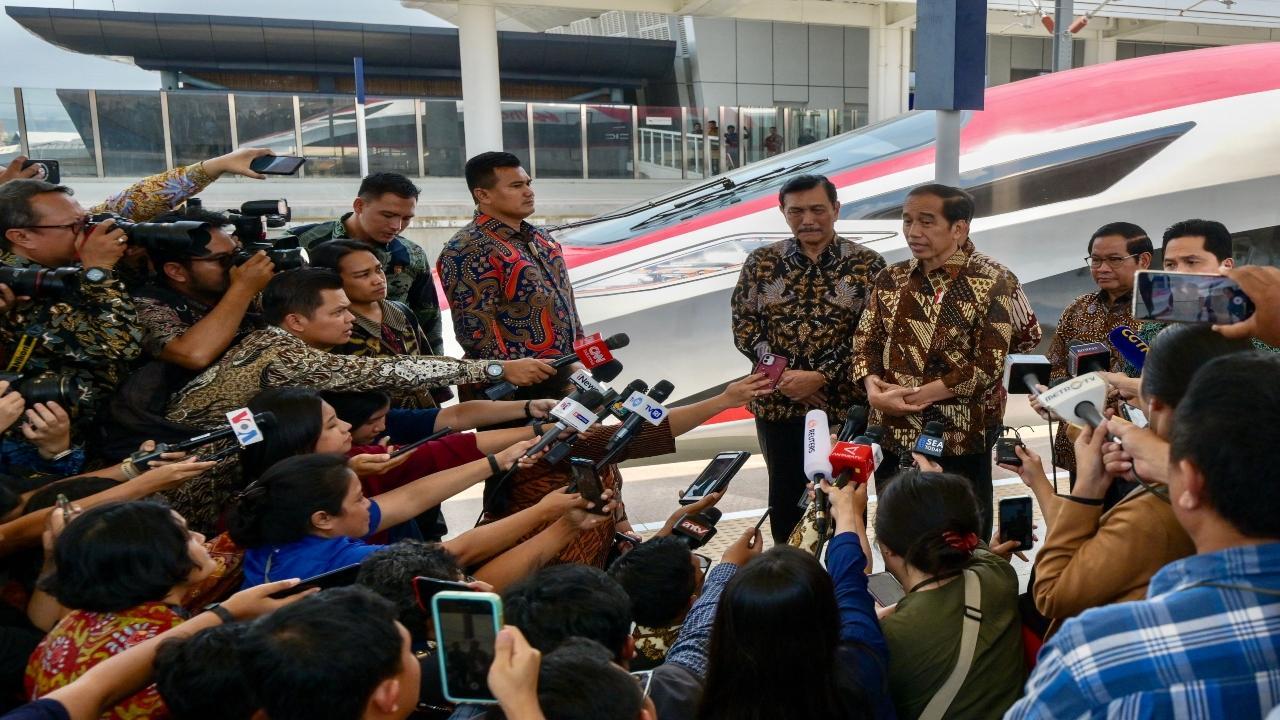Indonesian President Joko Widodo officially inaugurated Southeast Asia's inaugural high-speed railway project on Monday, marking a significant milestone for China's Belt and Road infrastructure initiative

Indonesian President Joko Widodo (3rd R) speaks to the press during the inauguration of the Jakarta-Bandung high-speed train named 'Whoosh' at Padalarang station in Padalarang, West Java on October 2, 2023. Photo: AFP
Indonesian President Joko Widodo officially inaugurated Southeast Asia's inaugural high-speed railway project on Monday, marking a significant milestone for China's Belt and Road infrastructure initiative. The railway is set to commence commercial operations, promising to dramatically reduce travel time between two major cities.
ADVERTISEMENT
The USD 7.3 billion project, largely financed by China, was overseen by PT Kereta Cepat Indonesia-China (PT KCIC), a joint venture between an Indonesian consortium of four state-owned companies and China Railway International Co. Ltd. Stretching over 142 kilometers (88 miles), the railway connects Jakarta and Bandung, West Java's densely populated capital, slashing travel time from three hours to just 40 minutes. Furthermore, its utilization of electrical energy is expected to contribute to a reduction in carbon emissions.
President Widodo unveiled the railway, the fastest in Southeast Asia with speeds of up to 350 kph (217 mph), under the name "Whoosh," derived from the Indonesian phrase "Waktu Hemat, Operasi Optimal, Sistem Handal," which translates to "timesaving, optimal operation, reliable system." During his opening remarks, President Widodo emphasized the project's significance, stating, "The Jakarta-Bandung high-speed train marks the modernization of our mass transportation, which is efficient and environmentally friendly."
High-ranking officials, including President Widodo, took an inaugural ride from Halim station in eastern Jakarta to Bandung's Padalarang station, with the journey providing a test of the train's capabilities at top speeds. Chinese Premier Li Qiang had previously taken a test ride during his visit to Jakarta for talks with ASEAN leaders.
Luhut Binsar Pandjaitan, the coordinating minister for maritime and investment, highlighted China Railway's commitment to transferring its technology to Indonesia, potentially enabling the domestic production of high-speed trains in the future.
Also read: Delhi police head constable arrested in rape case
Despite its delays and cost overruns, the railway project, initially slated to begin operations in 2019, now signifies a significant milestone in Indonesia's infrastructure development. It is part of a planned 750-kilometer (466-mile) high-speed train network, with potential extensions across four provinces on Java Island, ultimately connecting to Surabaya, Indonesia's second-largest city.
This initiative underscores China's increasing investment in Southeast Asia as the region seeks to strengthen economic ties. China's participation in infrastructure projects, such as this high-speed railway, plays a pivotal role in this endeavor, while global interest in such developments continues to grow.
A similar semi-high-speed railway, with speeds of up to 160 kph (99 mph), linking China to Laos, was inaugurated in December 2021. Financed predominantly by China under the Belt and Road policy, the project is expected to further extend across Thailand, Malaysia, and Singapore, cementing China's influence in the region. (With inputs from AP)
 Subscribe today by clicking the link and stay updated with the latest news!" Click here!
Subscribe today by clicking the link and stay updated with the latest news!" Click here!







